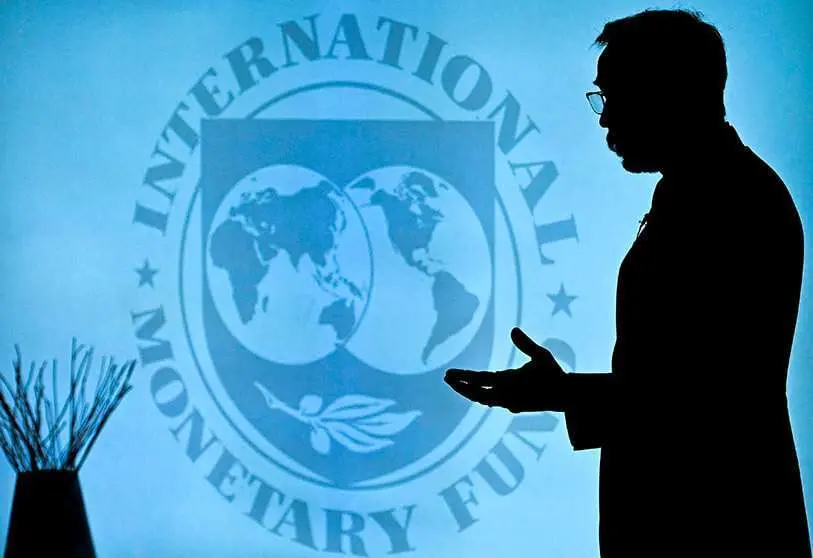The IMF foresees a new recession

It has described it as gloomy. The International Monetary Fund (IMF) highlights in its World Economic Outlook - updated in July - that growth is looking bleak and more uncertain.
Above all, it is bad news because the effect of the sanctions imposed on Russia is just beginning to be felt, because commodity markets are already showing their imbalances, doubly affected first by the disruption caused in production chains in 2020 by the confinements and border closures in the face of the advance of SARS-CoV-2, and then because the invasion of Ukraine has interrupted the supply of grain and other goods. Ukraine is not selling, nor is Russia selling to its usual customers.
Chaos is served on a golden platter in a globalised, vertebrate economy that was already suffering from - in principle temporary - inflation while waiting for the supply chains to be corrected. The war has chronified inflation.
The butterfly effect is exacerbating famine in several African countries and will not leave the political actions of many governments without consequences. We are heading for a new economic, political and social cycle. It is already inevitable.
If the Arab Spring (2010 to 2012) provoked a convulsion, a schism in several Arab-populated countries, the Russian invasion of Ukraine with Europe in the middle will provoke a change of cycle in a European Union (EU) that, sooner rather than later, will end up with several countries governed by the ultra-right and other fascist groups.
Everything is now in favour of the Russian dictator, Vladimir Putin. Every day that his atrocious invasion lasts longer, European public opinion is weakening, tired of the harmful effects of the sanctions and of being involved in a war that, although it is taking place in their backyard, is not theirs.
And the panorama could get worse because the worst part will come: the second half of the year with an autumn and winter with restrictions and cutbacks in heating, electricity and gas because there is not the usual supply due to the whole mess created around energy.
The EU, the US and other countries have vetoed Russian oil and several Russian banks out of the SWIFT system so that European countries cannot pay Russia anything with their euros from the outset; the Kremlin then demands payment in roubles and the EU is unwilling and unable to do so. Putin consequently starts cutting his gas supplies... Europeans panic because autumn and winter are just around the corner.
The economy is a living thing, if you kick it several times in the shin, it will end up sinking sore. The gradual sanctions started in the third week of February, followed in March with further rounds, in April with more punishments, then in May by tightening them, in June by adding new ones, and again in July.
The word recession is back on the horizon if economies such as the US, UK, Germany, Japan, France, Italy and Canada continue to plummet and their respective fiscal and monetary policy manoeuvres fail to arrest the decline and stabilise their economies.
The IMF cuts its growth outlook for 2022 by 0.4 percentage points (from April) to 3.2% in its July revision, with the most affected parties with lower economic growth expectations being: US at 2.3% and the euro area at 2.6%.
There are other regions that will perform more favourably: Latin America and the Caribbean with a GDP forecast of 3%; Asian and emerging countries with a GDP of 4.6%; the Middle East and Central Asia with a GDP of 4.8% and Sub-Saharan Africa with a GDP of 3.8%.
And in the 2023 scenario the situation is even more acute primarily for the United States with an estimated GDP of 1% and the Eurozone with 1.2%. World GDP next year, according to the IMF, will be 2.9%.
Both the United States and Europe will be most affected economically, but Ukraine's president, Volodymir Zelenski, continues to demand greater sacrifices from the Europeans with his insistence that no gas be bought from Putin. Zelensky only knows how to reproach, he does not appreciate the enormous sacrifice that has been made, in order to plunge us and the Ukrainians into the grey fog of uncertainty.
In order for a shocking boycott against Russia to work, we would have to ask for solidarity from the regions of Latin America, the Middle East, Central Asia and Africa. And there is not, nor will there be, because the gas that Europeans do not buy from Russia, the Kremlin supplies to India, China and Iran. The same goes for oil, which is why Lavrov has travelled to Africa to conclude agreements for the sale of its energy and to send them the wheat that the Europeans do not want.
The strategy of sanctions against Russia has come back as a boomerang of more inflation, lower growth, social discontent, public discontent and public opinion is fed up, and the rulers are becoming weaker in their government coalitions. The IMF believes that inflation this year will be 6.6% in advanced economies and 9.5% in emerging and developing economies. In addition to being gloomy, it is a drain on workers' pockets... there is no one who can stand it for long.

